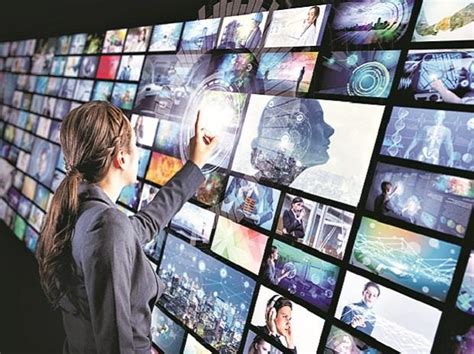How Technology is Reshaping the Entertainment Industry

Explore the impact of streaming platforms, virtual reality, AI, blockchain, and social media integration on entertainment. Learn how they are shaping viewer habits and personalized content curation.In today’s digital age, technology has revolutionized the entertainment industry in more ways than one. From the rise of streaming platforms to the integration of virtual reality and artificial intelligence, the way we consume and engage with entertainment has undergone a significant transformation. In this blog post, we will explore the various ways in which technology is reshaping the entertainment industry. We will delve into the impact of streaming platforms on viewership habits, the immersive entertainment experience offered by virtual reality, the personalized content curation enabled by artificial intelligence, the secure distribution and ownership facilitated by blockchain, and the audience engagement and promotion opportunities presented by social media integration. Join us as we discuss the exciting developments and innovations that are shaping the future of entertainment through the lens of technology.
Streaming Platforms: Changing Viewership Habits
In the age of digital transformation, streaming platforms have drastically changed the way people consume entertainment. With the rise of platforms like Netflix, Hulu, and Amazon Prime Video, viewers no longer rely on traditional cable TV for their favorite shows and movies. This shift in viewership habits has led to a decline in cable subscriptions and a rise in cord-cutting, as consumers opt for the convenience and flexibility of streaming services.
Furthermore, the availability of on-demand content on streaming platforms has also altered the way audiences engage with entertainment. With the option to binge-watch entire seasons of TV shows and access a vast library of movies at any time, viewers have the power to tailor their entertainment experience to their preferences and schedules. This shift in behavior has not only influenced the way content is consumed but also how it is produced, with streaming platforms investing in original content to attract and retain subscribers.
Additionally, the introduction of streaming services has given rise to a global audience, breaking down geographical barriers and providing access to diverse content from around the world. This has led to a more inclusive and diverse entertainment landscape, with audiences embracing content that reflects different cultures and perspectives. As streaming platforms continue to evolve and innovate, the way people engage with entertainment will continue to be transformed in ways we have yet to imagine.
Virtual Reality: Immersive Entertainment Experience
In recent years, virtual reality technology has revolutionized the way audiences experience entertainment. With the use of VR headsets, users are transported into immersive and interactive virtual environments, allowing them to engage with content in a whole new way.
Whether it’s watching a concert from the front row, exploring a virtual museum, or experiencing a thrilling adventure in a video game, VR offers a level of immersion and presence that traditional forms of entertainment simply cannot match.
As the technology continues to advance, we can expect to see even more innovative and immersive experiences in the world of entertainment, blurring the lines between reality and virtual worlds.
Artificial Intelligence: Personalized Content Curation
Artificial intelligence (AI) is revolutionizing the entertainment industry by offering personalized content curation to users. This technology uses algorithms to analyze user behavior, preferences, and consumption patterns to recommend tailored content. Through AI, streaming platforms and media companies are able to provide a more personalized and immersive experience for their audiences.
Moreover, AI allows for efficient content discovery by filtering through vast libraries of movies, TV shows, music, and more to present users with options that align with their interests. This not only enhances user satisfaction but also improves engagement and retention on digital platforms.
Furthermore, AI-powered content curation is also shaping advertising and marketing strategies in the entertainment industry. By understanding user preferences, AI can assist in delivering more targeted advertisements and promotions, leading to higher conversion rates and revenue for businesses.
Blockchain in Entertainment: Secure Distribution and Ownership
Blockchain technology has made a significant impact on the entertainment industry in recent years, particularly in terms of secure distribution and ownership of digital content. By leveraging the decentralized and immutable nature of blockchain, entertainment companies are able to ensure that their content is securely distributed and that ownership rights are protected. This has become increasingly important in the age of digital piracy and unauthorized sharing of content, as blockchain enables content creators to have greater control over how their work is distributed and accessed.
One of the key benefits of using blockchain for secure distribution and ownership in entertainment is the ability to create transparent and tamper-proof records of transactions. This means that every time a piece of content is transferred from one party to another, whether it be a streaming platform, a licensee, or an individual user, the transaction is recorded on a blockchain, making it easy to track and verify the history of ownership. This not only helps to prevent piracy and unauthorized use of content, but also ensures that creators and rights holders are fairly compensated for their work.
In addition to secure distribution and ownership, blockchain technology also has the potential to revolutionize the way that royalties and licensing fees are managed in the entertainment industry. Smart contracts, which are self-executing contracts with the terms of the agreement directly written into code, can be used to automatically facilitate the payment of royalties to content creators based on predefined conditions. This not only reduces the need for intermediaries and administrative overhead, but also ensures that creators receive their fair share of the revenue generated by their work.
Social Media Integration: Audience Engagement and Promotion
The entertainment industry has undergone a rapid transformation in recent years, largely due to the integration of social media platforms. With the rise of live streaming and user-generated content, social media has become a crucial tool in engaging and promoting entertainment content to a wider audience.
Streaming platforms such as Netflix and Disney+ have capitalized on social media integration to engage viewers and promote their shows and movies. By creating interactive experiences, such as live Q&A sessions and behind-the-scenes content, these platforms have successfully connected with their audience on a more personal level, leading to increased viewer engagement and loyalty.
Furthermore, social media offers a unique opportunity for content creators to connect directly with their fans, building a loyal community and promoting their work through platforms like Instagram and TikTok. By harnessing the power of social media, entertainers and artists can engage with their audience in real time, creating a more intimate and authentic connection that fosters support and promotion of their content.





